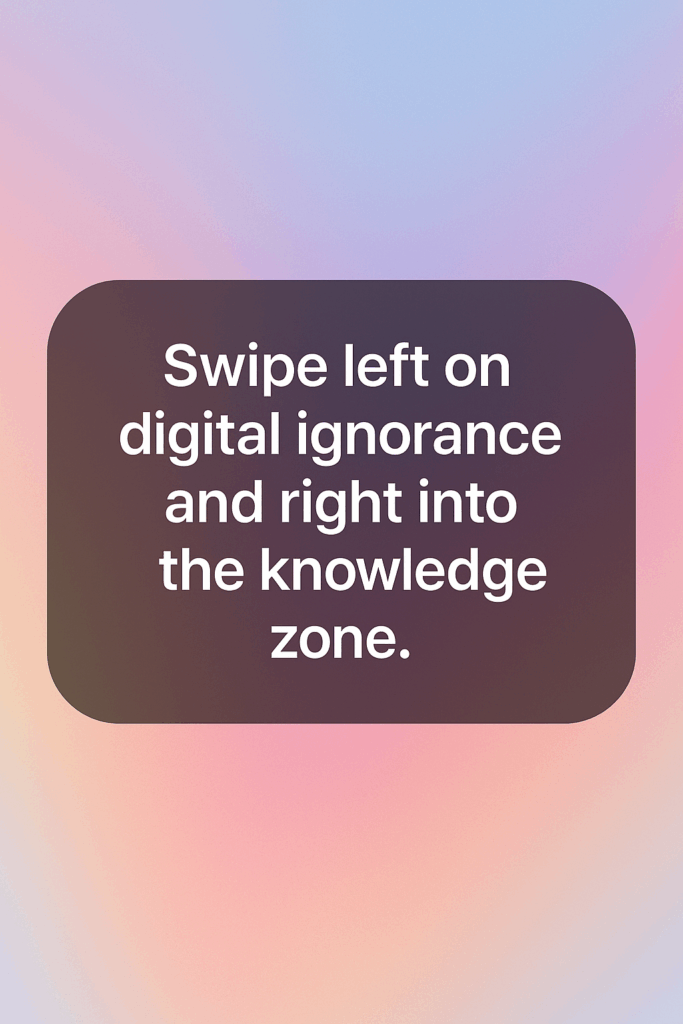
The importance of digital literacy sounds like just another modern buzzword, but its power stretches far beyond clicking a few buttons. About 52 percent of adults now see digital skills as crucial for moving forward in their careers. Turns out, knowing how to spot fake news or secure your data has become just as important as knowing your job itself.
Table of Contents
- Defining Digital Literacy: What It Is And Why It Matters
- The Role Of Digital Literacy In Modern Workflows
- How Digital Literacy Empowers Business Growth
- Key Components Of Digital Literacy For Success
- Real-World Examples Of Digital Literacy In Action
Quick Summary
| Takeaway | Explanation |
|---|---|
| Digital literacy is essential for success. | Mastering digital skills is critical for navigating modern professional environments and remaining competitive. |
| Technical skills boost professional adaptability. | Understanding technology helps professionals adjust to new tools and changes in the job market. |
| Critical thinking enhances digital information evaluation. | Assessing the credibility and relevance of digital content is crucial for informed decision-making. |
| Businesses benefit from precision marketing strategies. | Leveraging digital capabilities allows targeted marketing and personalized client experiences. |
| Ethics and security are integral to digital literacy. | Protecting digital assets and maintaining privacy are essential for successful online interactions. |
Defining Digital Literacy: What It Is and Why It Matters
The importance of digital literacy represents a fundamental skill set essential for navigating our increasingly technology driven world. More than just understanding how to use digital devices, it encompasses the comprehensive ability to locate, evaluate, critically analyze, and create digital content across various platforms and technologies.
Core Components of Digital Literacy
At its foundation, digital literacy involves multiple interconnected skills that enable individuals to effectively engage with digital environments. These skills include technical proficiency, critical thinking, communication, and ethical digital citizenship. Technical skills involve understanding how to operate devices and software, while critical thinking allows individuals to assess digital information for accuracy, relevance, and potential bias.
Key skills within digital literacy include:
- Information Evaluation: Ability to distinguish credible sources from misinformation
- Digital Communication: Understanding appropriate online communication protocols
- Cybersecurity Awareness: Recognizing potential digital threats and protecting personal information
- Content Creation: Developing skills to produce meaningful digital content
Practical Significance in Professional Contexts
In professional environments, digital literacy has become a critical competency. Research from the Pew Research Center indicates that approximately 52% of adults perceive digital skills as crucial for career advancement. Professionals who demonstrate strong digital literacy can leverage technology more effectively, adapt to emerging digital tools, and remain competitive in rapidly evolving job markets.
Beyond technical skills, digital literacy empowers individuals to transform information into actionable knowledge. It enables solopreneurs and freelancers to streamline operations, communicate professionally, protect their digital assets, and expand their professional networks through strategic online engagement. Understanding these digital skills is no longer optional but a fundamental requirement for success in the contemporary professional landscape.
To clarify the key components of digital literacy discussed above, the following table summarizes each major skill area and its primary significance in digital environments.
| Component | Description | Significance |
|---|---|---|
| Information Evaluation | Distinguishing credible sources from misinformation | Ensures accurate decision making |
| Digital Communication | Understanding online communication protocols | Facilitates effective professional interactions |
| Cybersecurity Awareness | Recognizing digital threats and protecting information | Safeguards personal and business data |
| Content Creation | Developing and sharing meaningful digital content | Supports engagement and brand building |
| Adaptive Learning | Quickly integrating new tools and platforms | Maintains relevance in changing environments |
| Critical Analysis | Evaluating credibility and relevance of digital information | Enhances informed decision making |
| Strategic Thinking | Applying digital skills to achieve specific objectives | Drives business growth and innovation |
The Role of Digital Literacy in Modern Workflows
In the contemporary professional landscape, digital literacy has transformed from a supplementary skill to an essential requirement across virtually every industry. Modern workflows are increasingly dependent on technological proficiency, making digital literacy a critical determinant of professional success and adaptability.
Digital Tools and Workflow Integration
Workplace technologies have revolutionized how professionals collaborate, communicate, and execute tasks. From cloud-based project management platforms to advanced communication tools, digital literacy enables seamless navigation through complex technological ecosystems. Professionals who understand how to effectively utilize these digital resources can significantly enhance productivity and operational efficiency.
Key technological integration skills include:
- Collaborative Platform Navigation: Understanding how to use shared workspaces and digital collaboration tools
- Cross Platform Compatibility: Ability to transfer and synchronize information across different digital environments
- Automation Understanding: Recognizing opportunities for workflow optimization through digital tools
- Data Management: Effectively storing, retrieving, and analyzing digital information
Professional Adaptability Through Digital Skills
Research from the Brookings Institution highlights that digital literacy is fundamental for adapting to emerging technologies and automation trends. Professionals with robust digital skills can more readily adjust to technological shifts, ensuring their continued relevance in rapidly evolving job markets. Learn more about digital marketing strategies that can complement these technological skills.
Moreover, digital literacy transcends mere technical competence. It encompasses critical thinking, strategic problem solving, and the ability to leverage digital resources creatively. Solopreneurs and freelancers who develop comprehensive digital literacy can differentiate themselves, streamline complex processes, and create more value for their clients through intelligent technological integration.
How Digital Literacy Empowers Business Growth
Digital literacy has emerged as a powerful catalyst for business growth, transforming how solopreneurs and freelancers develop, manage, and expand their professional offerings. By mastering digital skills, professionals can create more strategic, efficient, and competitive business models that adapt quickly to market changes.
Strategic Business Capabilities
Digital literacy enables businesses to leverage technology as a strategic asset rather than merely a functional tool. Professionals who understand digital platforms can create more sophisticated marketing strategies, automate complex processes, and develop more personalized client experiences. This technological proficiency allows for more intelligent resource allocation, reduced operational costs, and enhanced service delivery.
Key strategic advantages include:
- Precision Marketing: Targeting ideal clients through data driven digital channels
- Operational Efficiency: Automating routine tasks to focus on high value business activities
- Global Reach: Expanding business opportunities beyond traditional geographical limitations
- Real Time Analytics: Making informed decisions through immediate performance insights
Competitive Advantage in Digital Ecosystems
Research from McKinsey demonstrates that digitally fluent businesses outperform competitors by creating more adaptive and responsive operational models. Solopreneurs who invest in digital literacy can quickly pivot their strategies, understand emerging market trends, and develop innovative service offerings. Discover strategies for making critical business decisions that can amplify your digital capabilities.
Moreover, digital literacy transcends technical skills. It represents a comprehensive approach to understanding how digital technologies can solve complex business challenges, create unique value propositions, and establish stronger connections with potential clients. Professionals who view digital tools as strategic partners rather than mere technological accessories are better positioned to drive sustainable business growth in an increasingly digital marketplace.
To compare how digital literacy empowers both individuals and businesses, the following table outlines the main professional and organizational advantages associated with digital skill development and integration.
| Benefit Category | Individual/Professional Advantage | Business/Organizational Advantage |
|---|---|---|
| Adaptability | Adjust to new tools and market shifts | Pivot strategies in response to market trends |
| Operational Efficiency | Streamline workflows and save time | Automate routine tasks, reduce costs |
| Market Reach | Expand professional network and opportunities | Reach global clients beyond local limitations |
| Strategic Decision Making | Evaluate digital information critically | Use real-time analytics for faster decisions |
| Client/Customer Experience | Personalize communication and interactions | Deliver tailored services and targeted marketing |
| Security and Ethics | Protect personal assets and privacy | Safeguard business data, maintain trust |

Key Components of Digital Literacy for Success
Digital literacy is a multifaceted skill set that goes beyond basic technological competence. It represents a comprehensive approach to understanding, navigating, and leveraging digital technologies effectively in personal and professional contexts. Success in the digital age requires a nuanced understanding of various interconnected digital capabilities.
Technical Proficiency and Cognitive Skills
At the core of digital literacy are technical skills and cognitive abilities that enable individuals to interact meaningfully with digital technologies. This involves not just knowing how to use devices and software, but understanding underlying principles of digital systems, recognizing potential opportunities, and anticipating technological trends.
Critical cognitive components include:

- Adaptive Learning: Quickly understanding and integrating new digital tools and platforms
- Problem Solving: Using digital resources to develop innovative solutions
- Critical Analysis: Evaluating digital information for credibility and relevance
- Strategic Thinking: Applying digital skills to achieve specific professional objectives
Ethical and Security Dimensions
Research from the National Cyber Security Centre underscores the importance of understanding digital ethics and security as fundamental components of digital literacy. Professionals must develop skills to protect digital assets, maintain privacy, and navigate online environments responsibly. Learn strategies for digital marketing that prioritize ethical practices to enhance your professional digital presence.
Moreover, digital literacy encompasses an understanding of the broader social and ethical implications of technology. This includes recognizing potential digital risks, understanding data privacy principles, and developing a responsible approach to digital communication and content creation. Professionals who master these nuanced skills can build trust, maintain professional integrity, and create more meaningful digital interactions.
Real-World Examples of Digital Literacy in Action
Digital literacy transforms theoretical knowledge into practical professional capabilities, enabling individuals to navigate complex technological landscapes with confidence and strategic insight. These real-world applications demonstrate how digital skills translate into tangible business and personal advantages across various contexts.
Professional Adaptation and Innovation
Professionals across industries leverage digital literacy to reimagine traditional workflows and create innovative solutions. A wellness coach might use advanced digital tools to develop personalized online training programs, integrate client management systems, and create automated communication workflows. By understanding digital platforms, professionals can design more sophisticated, client-centric service models that transcend traditional engagement methods.
Compelling examples of digital literacy in practice include:
- Remote Collaboration: Managing international client projects through integrated digital platforms
- Content Strategy: Creating targeted digital marketing campaigns using data analytics
- Client Experience Design: Developing personalized digital touchpoints using advanced technological tools
- Operational Optimization: Implementing automated systems to streamline business processes
Digital Communication and Networking
Research from the Pew Research Center highlights how digital literacy enables more sophisticated professional networking and communication strategies. Solopreneurs who understand digital communication nuances can build stronger online professional networks, engage more effectively with potential clients, and establish thought leadership through strategic digital content creation. Explore digital marketing strategies for solopreneurs to enhance your professional digital presence.
Beyond technical skills, these real-world applications underscore digital literacy as a dynamic competency. Professionals who continuously adapt, learn, and integrate emerging technologies position themselves at the forefront of their industries, transforming digital challenges into opportunities for growth and innovation.
Take the Leap from Digital Literacy to Digital Mastery for Your Solo Business
You have just learned that digital literacy is more than using tools—it is about leveraging digital skills to evaluate information, communicate effectively, and protect your business. But for many solopreneurs and freelancers, translating these skills into real business growth can feel overwhelming. Are you struggling to connect your digital know-how to actual business results? Do you want to make every task—from client management to marketing—work for you, not against you?

Let your digital skills work harder for you today. Fluum.ai is built for solopreneurs like you who want a streamlined, AI-powered co-founder to bridge the gap between digital literacy and successful business operations. Why wait to level up your workflow, protect your data, or maximize your revenue? See how you can put your skills to work with our all-in-one business automation platform and access practical guides for growth. Your next step is simple—visit our pricing page to unlock resources and grow smarter, not harder.
Frequently Asked Questions
What is digital literacy and why is it important today?
Digital literacy refers to the ability to locate, evaluate, analyze, and create digital content. It’s crucial today because it empowers individuals to thrive in a technology-driven world, enhances career prospects, and enables effective communication and information evaluation.
How can I improve my digital literacy skills?
You can improve your digital literacy skills by engaging with various digital tools and platforms, participating in online tutorials, or taking courses focused on technology use. Start by dedicating 1-2 hours a week to practical exercises, such as creating documents or using project management software.
What are practical applications of digital literacy in the workplace?
Digital literacy applies in the workplace through enhanced collaboration, effective communication, and data management. For example, by mastering collaborative tools, you can improve project communication and file sharing, significantly reducing project updates time by ~30%.
How does digital literacy relate to cybersecurity awareness?
Digital literacy includes an understanding of cybersecurity, which is recognizing threats and protecting personal information online. Enhance your skills by regularly reviewing online security practices and conducting assessments of your digital safety measures at least once a month.
What steps can freelancers take to utilize digital literacy for business growth?
Freelancers can utilize digital literacy by creating effective marketing strategies, automating tasks, and analyzing client data. Focus on implementing at least one new digital tool to streamline operations or enhance client outreach every quarter.
How can I assess my current level of digital literacy?
You can assess your digital literacy through self-reflective quizzes or by examining your proficiency with common digital tools and concepts. Create a list of skills you want to improve, and aim to achieve proficiency in at least three areas within the next 60 days.
Recommended
- Fluum | Effective Stress Management Techniques for Busy Professionals
- Fluum | How to Onboard Clients Effectively for Lasting Success
- Fluum | Master Managing Multiple Projects for Success
- Fluum | Build Your Brand with a Branding Builder in 2025
- Fluum | 7 Customer Retention Examples to Boost Your Business



